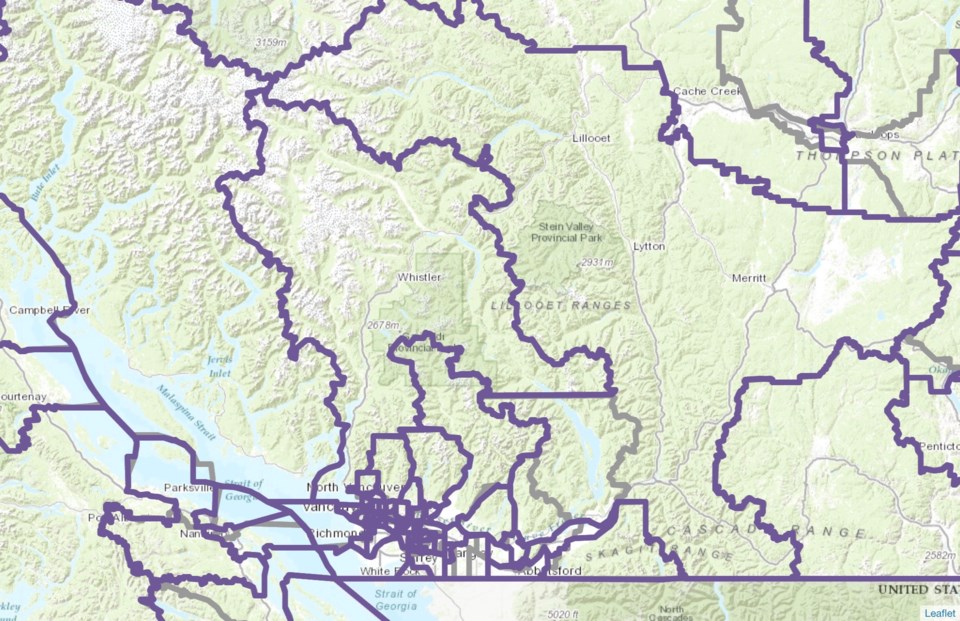B.C.’s West Vancouver-Sea to Sky electoral district could get a whole lot smaller.
Earlier this month, British Columbia’s Electoral Boundaries Commission released its final report recommending a redrawing of electoral boundaries across the province ahead of the next election. Reflecting the rapid growth of the Sea to Sky, the riding would lose a notable portion of the City of West Vancouver.
The area recommended to be cut and added to the neighbouring West Vancouver-Capilano electoral district spans from Rogers Creek, near 28th Street, to Cypress Creek, near Stearman Avenue, and includes the neighbourhoods of Altamont, West Bay and Westmount, with the northern boundary set at Highway 1.
Even while losing 3,650 residents under the proposed boundaries, the reimagined riding would still count one of the largest populations in the province, at 62,161, which is 15.6 per cent above the provincial average. Only two other ridings in B.C.—the redrawn West Vancouver-Capilano district, and the Salmon Arm-Shuswap district in the Interior—would have more residents.
Jordan Sturdy, MLA for West-Vancouver Sea to Sky and former Pemberton mayor, expected to see the change in the riding’s boundaries to keep pace with population change, but was surprised the riding’s population remained among the highest in the province.
“What I was actually anticipating was that there’d be probably a lower population in the Sea to Sky than what they set [the boundaries at], so that it could allow for future growth, because if we continue to see 22-, 19- and 32-per cent growth in the Sea to Sky [reflecting population growth in Squamish, Whistler and Pemberton, respectively] over the last census period, obviously, that will put things significantly out of balance,” he said.
The average electoral quotient in the province is 53,773 people. Several ridings in Northern B.C. have populations well below the average. Still, the commission decided against recommending to enlarge the ridings due to their vast geography.
The result of the commission’s proposal, Sturdy posited, is that a vote in a riding like Peace River South, with a population of only 25,635, is worth nearly twice as much as a vote in West Vancouver-Sea to Sky.
The report also recommends the creation of six new ridings, four in Metro Vancouver and one each in the Okanagan and Southern Vancouver Island, and changes to the boundaries of 72 of the 93 ridings in the legislature to account for the province’s growing population, which rose by 7.6 per cent between 2016 and 2021.
How will new boundaries affect future elections?
The 2020 provincial election saw the BC Green Party surge in the Sea to Sky region by 8.66 per cent, winning nearly every poll north of Horseshoe Bay, including every poll in Whistler and Pemberton, and coming within a hair of taking the riding from the BC Liberals, who have held the riding by strong margins since 1991.
The BC Liberal Party (now BC United Party) won the riding by just 60 votes, after a judicial recount confirmed the win by a margin of just 0.24 per cent, the closest race in the province. Sturdy’s narrow victory was largely due to him taking West Vancouver by healthy margins, winning a dozen polls there by more than 60 per cent. Now, under the redrawn boundaries, some of these areas will now be in the neighbouring West Vancouver-Capilano riding.
Sturdy doesn’t believe changing riding boundaries will significantly impact the results in the next election, pointing to the 2020 election as an outlier pandemic election with a party leader few in the riding were excited about.
“Honestly, I don’t believe that we can look at 2020 as a normal election. Every election is unique. It has a unique cast of characters, leaders, policies, and visions, so I think each election is unique and is fought on a case-by-case basis,” Sturdy said.
“People seemed to like [former Premier John Horgan] as an individual, but it’s never really been a NDP region or riding. But for us, I think many people didn’t like the BC Liberal leader either, very much so. So, if they couldn’t vote for him, they didn’t want to vote NDP, so what’s your choice?”
Assuming Premier David Eby doesn’t call an early election, the next provincial election is set to take place on Oct. 19, 2024. So far, only the BC Green Party has confirmed their candidate for West-Vancouver-Sea to Sky, with former District of Squamish staffer, Jeremy Valeriote, returning for another run. Sturdy would not say if he intends to run in the next election.
Valeriote, meanwhile, said he is generally happy with the redrawn boundaries.
“It makes it more likely than ever to allow voters to elect a BC Green candidate, which is great. I think people in the past maybe thought that a Green vote wasn’t the best use of their vote, but now that we see the potential to elect a BC Green, I think it’s a promising possibility,” he said.




